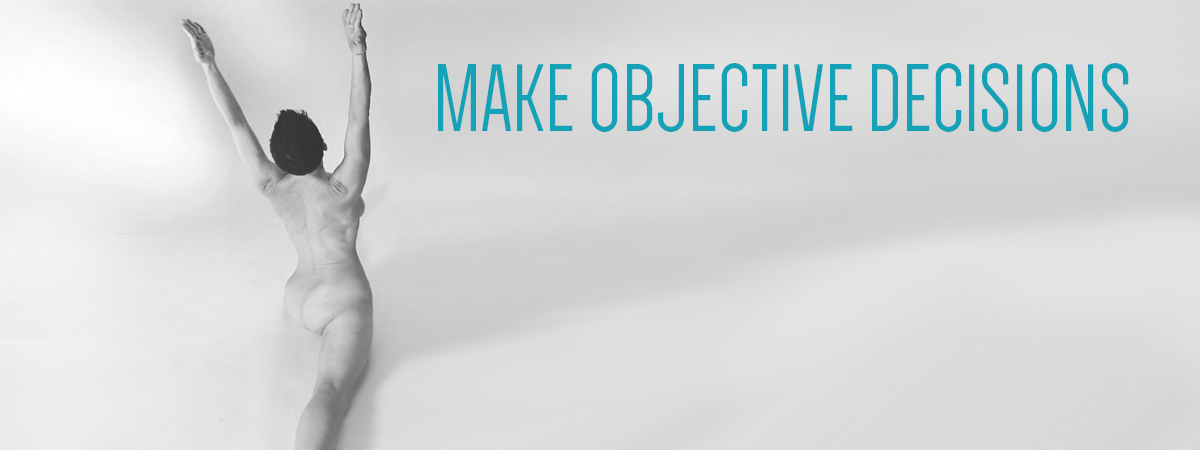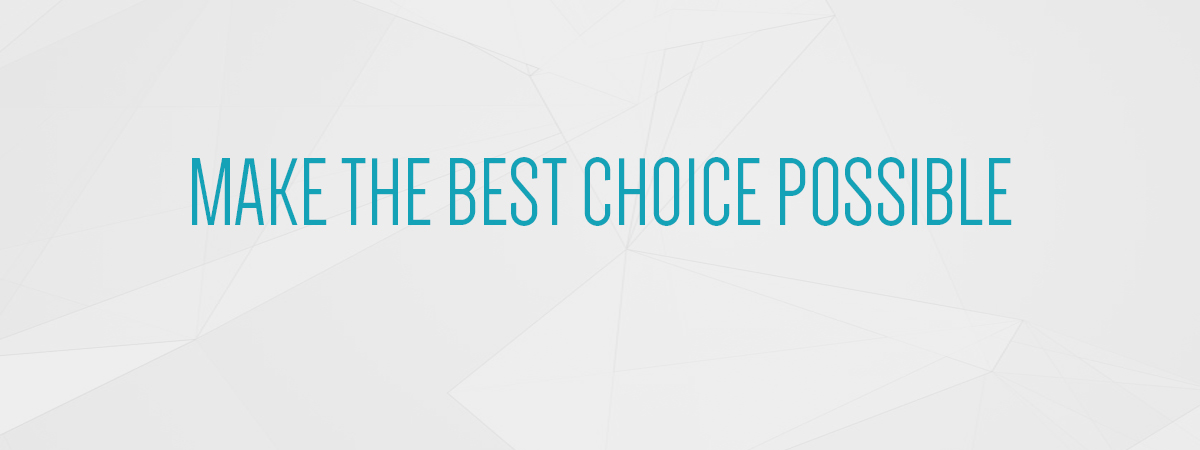
 Generally we think we make decisions based on facts, but reality is that emotions, bias and self-serving interest can creep in when it’s least convenient.
Generally we think we make decisions based on facts, but reality is that emotions, bias and self-serving interest can creep in when it’s least convenient.
We all like to think that we are objective and make our decisions based on the facts and circumstances of any given situation, but the truth is we all have biases and if we don’t pay attention they can cost us relationships, opportunities, money or even injuries.
Decisions can be incredibly difficult, but there are strategies to make sure that we increase our chances of making the right choice by eliminating emotional influences that might compromise, alter or change our decision. Sure, this is a lot easier said than done, but how can we objectively decide between two options?
As human beings there is a limit to our objectivity, but with the right tools and practice, it is within reach to make the most objective decision possible. Here are our TOP 10 tips to make your next decision more objective.

#1 Acknowledge Your Bias
However much you like to believe that your decisions are objective, whenever your biases and emotions start to interfere with your evaluation they become subjective. The answer to that is pretty simple. Become aware of your emotions, acknowledge your biases and evaluate how your emotions and biases contribute to your decision. Look at past experiences and the assumptions you have made. Think critically about your emotions and feelings and determine if the decision is based on facts or on your biases.
#2 Step Outside Yourself
A recent study out of Princeton found that we tend to be more objective, when we pro-actively try to come to a decision that appears to be objective to somebody else. To eliminate your personal bias when making a decision, pick a random person from your life – maybe someone who you truly respect – and imagine yourself explaining your decision-making process to the other person. If you are still in doubt, practice with somebody in person. You will be amazed how much insight in yourself and your decision-making process you will get.
#3 Declutter Your Mind
A lot of times we are forced to make a decision in a whirlwind and with all the new information and emotions to process, it’s easy to come to an overly-subjective decision. Take a few moments before coming to a decision and allow yourself to clear your mind and let those initial emotions fade into the background so that you can come back to the choice you have to make with a much more objective state of mind. Next time you are asked to make a decision in the heat of the moment, take a few minutes to close your eyes and meditate, listen to music, do some stretches or go for a walk. You’ll come back to your decision-making with a much smarter state of mind and cooler blood.
#4 Look at the Bigger Picture
As human beings we tend to base our decisions on the newest information that comes to our attention and often times overlook what we already know as facts. Let the dust of the new discovery settle and instead of making a snap decision, let your emotions pass before you make a choice you later regret. As we’ve mentioned above, give yourself the chance to calm down, bring the new information into context and make the decision with a calm, collected state of mind.

#5 Be Positive
One of the reasons we are so stressed out when having to make a major decision is that we see the potential negative consequences and want to do anything we can to avoid feeling regrets. But focusing on the potential negative issues is extremely emotional, which makes it hard to focus and make an objective decision. Instead of focusing on avoiding a potential negative outcome, focus on the potential positive consequences of your decisions and with that put yourself in a much more positive frame of mind that can make more objective decisions.
#6 Consider Your Whys
You may have already heard about the 5 whys. The 5 whys are extremely helpful when you try to make an objective decision whether that’s in your professional or personal life and can help you solve problems and come up with new ideas. What is the goal you want to achieve with this decision? What are the options from which you can choose from? What are the facts that you objectively know about the situation at hand? What is the potential outcome of each possibility? And which direction point the answers to the aforementioned questions to? Having a structured process will help you to make a much more objective decision.
#7 Use a Pro and Con List
Using a pro and con list is an old strategy that is still worthwhile. Consider the options of your decision and make a factual pro and con list that you rate in terms of importance. Making a list gives you all the positive and negative consequences and helps you visualize the outcome. Go through the list, weigh the pros and cons and come to a factual conclusion.
#8 Reverse Your Line of Thinking
It’s unpreventable and natural to make assumptions when you try to make a decision, but that doesn’t mean you can’t play with those assumptions. When you for example assume that you will free up an hour a day with your decision, reverse your line of thinking and assume you will lose an hour a day. How would your decision play out with the reversed assumption. Experiment with reversing your assumptions and you will get a much clearer picture of what direction you have to go.
#9 Invite Other Views
You may think you have all the facts and know everything there is to know about a particular situation, but it can be a good idea stop for a moment and check your point of view for objectivity with a trusted person. Make sure that you ask others to share their point of view in a nonthreatening way so that you can objectively compare opinions and see what information you may have been missing before making a final decision.
#10 Make a Decision and Live With It
No matter how much you weigh your pros and cons and consider all the facts and possible consequences, ultimately you have to make a choice. Don’t delay your decision, make a choice and stick to it because even if it’s a bad decision, it is still a lot better than not making any decision at all. And whatever consequences may arise, know that you always have the possibility to make a new decision later on. No decision is ever final, so make your decision and live with it.
We make thousands of decisions every single day and while we are mostly unaware or don’t pay much attention to those decisions, there are at least a handful of important decisions each day that we are aware of. While nobody ever teaches us how to make objective decisions, it is possible to learn how to make objective choices by becoming aware, paying attention, seeing the bigger picture and focusing on the facts rather than our emotions.
MAKE THE BEST CHOICE POSSIBLE
Joschi & Monika
#BoldNaked
